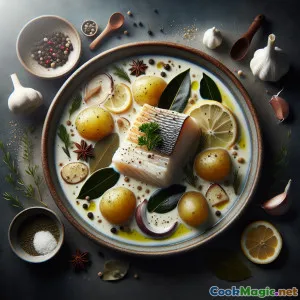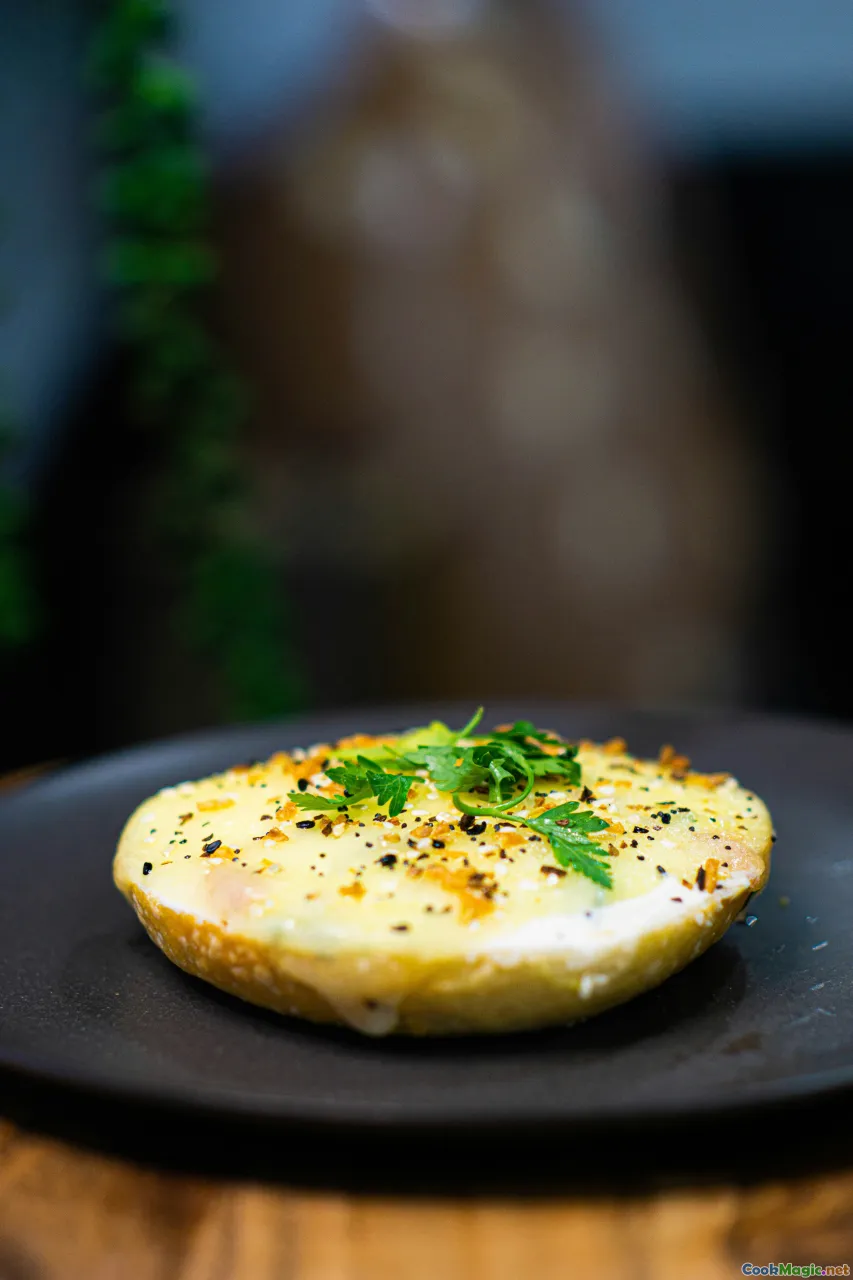
Rustik Lot-et-Garonne morina ve patatesli Brandade
(Rustic Lot-et-Garonne Cod Potato Brandade)
(0 Yorumlar)0
1,058
Temmuz 19, 2025
Bir Sorun Bildir
Malzemeler
-
350 grams Tuzlu morina balığı
(Soğuk suda 24 saat bekletildi ve su birkaç kez değiştirildi.)
-
400 grams Yukon Gold patatesleri
(Soyulmuş ve dört parçaya bölünmüş)
-
4 cloves Sarımsak dişleri
(İnce kıyılmış)
-
80 ml Zeytinyağı
(En iyi aroma için yüksek kaliteli sızma zeytinyağı kullanın.)
-
120 ml Tam süt
(Isıtın veya daha zengin bir doku için ağır krem kullanın.)
Defne yaprağı, 1
-
1/2 tsp Karabiber
(Yeni kırılmış)
-
1 tbsp Maydanoz
(İnce doğranmış)
-
1/8 tsp Muskat
(Taze rendelenmiş)
-
1 tsp Limon kabuğu
(Parlaklık için isteğe bağlı)
(Soğuk suda 24 saat bekletildi ve su birkaç kez değiştirildi.)
(Soyulmuş ve dört parçaya bölünmüş)
(İnce kıyılmış)
(En iyi aroma için yüksek kaliteli sızma zeytinyağı kullanın.)
(Isıtın veya daha zengin bir doku için ağır krem kullanın.)
(Yeni kırılmış)
(İnce doğranmış)
(Taze rendelenmiş)
(Parlaklık için isteğe bağlı)
Besin Değerleri
- Porsiyon: 4
- Porsiyon Boyutu: 1 küçük tabak (220 g)
- Calories: 340 kcal
- Carbohydrates: 38 g
- Protein: 24 g
- Fat: 12 g
- Fiber: 3 g
- Sugar: 1 g
- Sodium: 1400 mg
- Cholesterol: 60 mg
- Calcium: 100 mg
- Iron: 1.8 mg
Talimatlar
-
1 - Tuzlu morinayı ıslat:
Tuzlu morina balığını durulayın ve aşırı tuzu gidermek için 24 saat boyunca soğuk suya yatırın; suyu 3-4 kez değiştirin; süzün ve bir kenara alın.
-
2 - Morina balığını haşla:
Morina balığını bir tencereye koyun, üzerine soğuk su ekleyin ve bir defne yaprağı ilave edin. Kısık ateşte 12 dakika ya da etler dağılıncaya kadar pişirin. Morina balığını çıkarın ve defne yaprağını atın.
-
3 - Patatesleri pişir:
Soyulmuş patatesleri tuzlu suda yumuşayıncaya kadar kaynatın (yaklaşık 15–20 dakika). İyice süzün.
-
4 - Sarımsak yağı hazırlayın:
Bir tavada doğranmış sarımsakla zeytinyağını yavaşça ısıtın, aroma çıkana kadar (kızarmayın), yaklaşık 5 dakika. Ateşten alın.
-
5 - Püre yap ve karıştır:
Sıcak patatesleri ezin, kılçık/derisi alınmış haşlanmış morina balığı ekleyin, sonra sarımsaklı zeytinyağı ile karıştırın ve ılık süt ekleyin. Çok pürüzsüz ve kabarık olana kadar karıştırın.
-
6 - Tadına göre baharatlandırın:
Kullanıyorsan karabiber, maydanoz, muskat ve limon kabuğu rendesi ekleyin. Baharatı ayarlayın. Karışım ipeksi bir püre olana kadar karıştırın.
-
7 - Servis yapmak:
Çok küçük tabaklara veya çanaklara kaşıkla paylaştırın, ek olarak maydanoz veya zeytinyağı ile süsleyin. İsterseniz sıcak olarak, kıtır ekmekle birlikte servis edin.
Tuzlu morina balığını durulayın ve aşırı tuzu gidermek için 24 saat boyunca soğuk suya yatırın; suyu 3-4 kez değiştirin; süzün ve bir kenara alın.
Morina balığını bir tencereye koyun, üzerine soğuk su ekleyin ve bir defne yaprağı ilave edin. Kısık ateşte 12 dakika ya da etler dağılıncaya kadar pişirin. Morina balığını çıkarın ve defne yaprağını atın.
Soyulmuş patatesleri tuzlu suda yumuşayıncaya kadar kaynatın (yaklaşık 15–20 dakika). İyice süzün.
Bir tavada doğranmış sarımsakla zeytinyağını yavaşça ısıtın, aroma çıkana kadar (kızarmayın), yaklaşık 5 dakika. Ateşten alın.
Sıcak patatesleri ezin, kılçık/derisi alınmış haşlanmış morina balığı ekleyin, sonra sarımsaklı zeytinyağı ile karıştırın ve ılık süt ekleyin. Çok pürüzsüz ve kabarık olana kadar karıştırın.
Kullanıyorsan karabiber, maydanoz, muskat ve limon kabuğu rendesi ekleyin. Baharatı ayarlayın. Karışım ipeksi bir püre olana kadar karıştırın.
Çok küçük tabaklara veya çanaklara kaşıkla paylaştırın, ek olarak maydanoz veya zeytinyağı ile süsleyin. İsterseniz sıcak olarak, kıtır ekmekle birlikte servis edin.
Rustik Lot-et-Garonne morina ve patatesli Brandade :Hakkında Daha Fazlası
The Story & Soul of Brandada de Lòt e Garona
'Brandada de Lòt e Garona' is a delectable reinvention of the traditional French brandade, a recipe at the heart of Southern French and Basque-Gascon cuisine. Typically associated with Nîmes or Marseille as "Brandade de Morue,” this dish travels west to Lot-et-Garonne (or Lòt e Garona in Occitan), an oft-overlooked department where French Occitan and Gascon flavors thrive amid sun-washed landscapes and rustic villages.
History and Roots
Salt cod recipes proliferated through Southern Europe after cheap salt and fish trade connections bloomed in medieval times. In Aquitaine and Gascogne, salt cod – morue or bacalhau – became a pantry staple during Lent or feast days when meat was scarce. Immigrants and itinerant laborers shaped Lot-et-Garonne’s version into a richer, tangy concoction, always with robust local olive oil and garlic. It's both a humble peasant meal and prideful feast fare, a comfort food soothing chilly riverbank workers or splashed on rich dinner party toasts.
What's Unique?
Unlike the Emulsion-heavy brandade de Nîmes, Lot-et-Garonne locals favor more texture—flakey cod balances creamy potato. Sweet flecks of garlic imbricate each bite, while bright olive oil and peppery parsley tie the South-West together. Adding potatoes is locally encouraged – a mark of rural adaptability – and optional hints like lemon zest or nutmeg echo the subtle Gascon love of intrigue and depth in food.
Recipe Tips and Best Practices
- Selecting Cod: In Gascony, salt cod is soaked at length—don’t rush desalinization, as too much salt will overpower this gentle mash. Taste a small piece before using!
- Alternative Fish: Fresh cod (briefly poached then salted slightly) is workable, but lacks the robust flavors salt-packed fish imparts.
- Emulsifying: Stir vigorously, but gently—brandada should be luscious, not gluey. For a heartier dish, hand-mashing is best; for smoothest purity, use a stand mixer or immersion blender before final mixing.
- Serving Suggestions: Brandada is traditionally spread on toasted bread, but in Lot-et-Garonne, it could arrive in clay ramekins or scooped with grilled seasonal veg. It pairs beautifully with a white Bordeaux & sides like green salad.
Cultural and Seasonal Significance
Brandada binds family around harvest-time tables, a symbol of communal spirit. Its simplicity and accessibility reflect Gascony’s landscape: humble vegetables, preserved seafood, and festive aromatics. The dish is especially prevalent from September to April, though the Occitan tradition says it’s hearty enough for year-long relish.
Personal Notes
What makes 'Brandada de Lòt e Garona' compelling to me is its abundant honesty and versatility. Gascon dishes always balance rustic depth with convivial celebration, welcoming personal tweaks—try adding techniques borrowed from Basque pipérade or even a hint of Armagnac for a festive twist. Don’t shy away from robust olive oil: its grassy character is essential!
Whether you’re a lover of classical French cuisine or adventurous enough to embrace rural Occitan gastronomic roots, this dish invites a culinary journey across borders and through time. It’s comfort food with soul, celebration, and stories in every forkful.

























